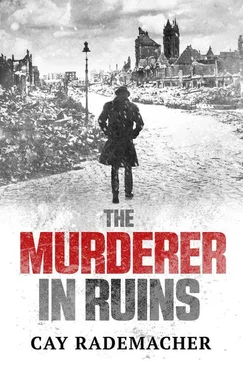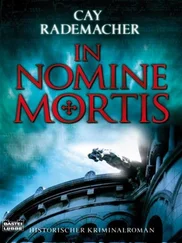Cay Rademacher - The Murderer in Ruins
Здесь есть возможность читать онлайн «Cay Rademacher - The Murderer in Ruins» весь текст электронной книги совершенно бесплатно (целиком полную версию без сокращений). В некоторых случаях можно слушать аудио, скачать через торрент в формате fb2 и присутствует краткое содержание. Год выпуска: 2015, ISBN: 2015, Издательство: Arcadia Books Limited, Жанр: Триллер, на английском языке. Описание произведения, (предисловие) а так же отзывы посетителей доступны на портале библиотеки ЛибКат.
- Название:The Murderer in Ruins
- Автор:
- Издательство:Arcadia Books Limited
- Жанр:
- Год:2015
- ISBN:9781910050750
- Рейтинг книги:5 / 5. Голосов: 1
-
Избранное:Добавить в избранное
- Отзывы:
-
Ваша оценка:
- 100
- 1
- 2
- 3
- 4
- 5
The Murderer in Ruins: краткое содержание, описание и аннотация
Предлагаем к чтению аннотацию, описание, краткое содержание или предисловие (зависит от того, что написал сам автор книги «The Murderer in Ruins»). Если вы не нашли необходимую информацию о книге — напишите в комментариях, мы постараемся отыскать её.
The Murderer in Ruins — читать онлайн бесплатно полную книгу (весь текст) целиком
Ниже представлен текст книги, разбитый по страницам. Система сохранения места последней прочитанной страницы, позволяет с удобством читать онлайн бесплатно книгу «The Murderer in Ruins», без необходимости каждый раз заново искать на чём Вы остановились. Поставьте закладку, и сможете в любой момент перейти на страницу, на которой закончили чтение.
Интервал:
Закладка:
‘That would mean that the victims come from three different families and lived in three different places. Then surely somebody would have come forward to identify at least one of them,’ Stave said quietly. ‘It’s simply not possible for so many people to be murdered in the middle of Hamburg without anyone missing any of them.’
‘We don’t know about the child yet,’ Dr Czrisini reminded him.
‘Quite,’ the chief inspector said, nodding. ‘We need to get a new poster printed. You deal with that, Maschke. Get as many printed as possible and include a photo of the medallion on it. Get in touch with the authorities in all the big cites, including those in the east. I want our posters up even in the Soviet zone.’
A telephone in the outer office rang, causing them all to flinch. Erna Berg went to answer it, said a few words and put the receiver down.
‘That was the police in Lubeck,’ she called out to the chief inspector. ‘The mother of the ship watchman has confirmed that her son was staying with her the past two weeks. One of her neighbours saw him too.’
‘Well, I guess that would have been too easy,’ Stave said, and crossed out a line in his notebook.
‘What next?’ MacDonald asked.
‘We still have three hypotheses,’ Stave said. ‘If the killer is a looter who murders people amongst the ruins to steal everything from them, then sooner or later an item will turn up on the black market that we can link to one of the victims. Maybe somebody will finally see a suspicious character lurking in the ruins. Or some spiv or pimp will hear something. It could be that in the next day or two we manage to identify one of the victims. And you never know, we might even catch him in the act. Sooner or later we’ll get him.
‘Hypothesis two: some madman is killing people and leaving this strange medallion as a calling card. In which case, does anyone have any idea how we might get a lead on him?’
‘We urgently need to find out what this cross and two daggers is all about,’ Dr Czrisini replied.
‘If it is a madman, then he won’t necessarily stop killing. Sooner or later we’ll catch him at it,’ Maschke said hopefully.
‘Somebody will catch him,’ Stave replied. ‘But will it be us, or those who’ve taken our jobs?’ He quickly tried to banish that note of pessimism, standing up straight and announcing: ‘Hypothesis three: somebody wiped out a whole family. In that case, there may be no more victims, no more objects and no witnesses. Or we find the bodies of more people who were killed at the same time as our current victims. So we should be looking not for a murderer who has vanished without trace, but for a family that nobody has reported as missing.’
‘Refugees from the east or Displaced Persons,’ MacDonald murmured.
‘Let’s start with the child,’ Stave told them. ‘Maybe we’ll have more luck than with the other two. Perhaps there are carers, teachers, playmates who’ll recognise her. She must have gone to school somewhere. Let’s knock on the doors of schools and homes that house the children of refugees and DPs.’
The phone rang again. Stave, who hadn’t had a call in days, stared in irritation at the black object. His secretary nodded, said something politely and hung up.
‘Department S,’ she said. ‘They’ve sent out plainclothes people to all the black market areas. None of them have come across a Spencer. But they promise to keep their eyes open.’
‘Good,’ Stave replied, even though he was suddenly quite certain that they were never going to find relevant items of clothing popping up on the black market. Somebody was systematically covering their tracks.
‘I’ll get on with the poster then,’ said Maschke, and vanished.
‘I have work to do in the pathology department,’ Dr Czrisini said. ‘The body will need to thaw first. Not that I expect examination of the girl’s body to reveal anything I don’t already know.’ He gave a low bow and left the room.
‘You should just go home,’ Stave said to MacDonald and Erna Berg. ‘There’s nothing more to be done here today.’ He stood there and watched the pair of them until the door to the outer office closed behind them.
The public prosecutor was scratching his bald head when Stave walked in. The office was almost warm. The chief inspector inhaled gratefully the aroma of freshly brewed tea. It felt more like a living room than an office, Stave thought to himself, and wondered if Ehrlich spent every Sunday here.
‘Sorry I had to drag you away from the station,’ Ehrlich said, nodding towards the guest chair. ‘You were looking for your son?’
The chief inspector stared at the prosecutor dumbstruck, as if he’d been caught doing something embarrassing.
Ehrlich waved his arms to say it was of no importance. ‘I was just guessing. I had heard your boy was unaccounted for.’
‘I don’t like that term,’ Stave replied.
‘And yet there is a trace more hope in it than in “missing”. Or just “gone”. Don’t you think?’
‘You also have sons,’ Stave said. The prosecutor might as well know he knew things about other people’s private lives too.
Ehrlich nodded calmly. ‘Two boys. They’re at boarding school. Back there.’
Stave took a second to realise that Ehrlich meant England.
‘They’re teenagers. It’s a difficult age. And the last few years haven’t been easy. I was in exile. They had to endure humiliation here, and then the passing of my wife.’
‘Unaccounted for’ instead of ‘missing’, ‘passing’ instead of ‘suicide’. Stave had read some of the indictments Ehrlich had written and been impressed by his precise, crisp style. But obviously he kept that for indictments, a weapon best kept concealed when dealing with friends. He changed the subject, not wanting any more details of Ehrlich’s personal tragedies, and certainly not willing to give any further details of his own. He gave him a quick rundown on the latest murder.
‘Does this give the case a new dimension?’ Ehrlich asked.
Stave sat staring at the prosecutor in silence, not knowing what to say.
Ehrlich passed the time cleaning his glasses, then said: ‘Men and women being killed is horrible, but it happens all the time. A child, however? Isn’t that the last taboo? A total abnegation of the slightest morality?’
‘If you mean, are we looking for a murderer who is capable of absolutely anything, then the answer is yes, in my opinion. A man devoid of any scruples,’ Stave agreed.
‘Most killers who do away with children are driven by uncontrollable emotions, either sexual lust or despairing mothers lashing out in a fit of anger or revenge. But in this case the murder is so…’
‘…methodical,’ Stave completed the sentence for him. ‘The deed is simply carried out in cold blood, using – if you’ll forgive the expression – a tried and tested formula. Then afterwards all traces are erased.’
‘Remind you of something?’ Ehrlich asked in a quiet voice.
‘The concentration camps,’ Stave answered immediately. ‘The Gestapo. Special Units, SS. Men who killed irrespective of the age or gender of their victims. Systematic murderers who carried out their killings methodically, the corpses either dumped in mass graves or gone up in smoke. Documents that simply disappeared, camps that were emptied before the Allies arrived.’
‘Well, that’s not exactly a lead in itself,’ Ehrlich said pensively, ‘but it just might be the beginning of a lead.’
‘The concentration camp guards are already on trial,’ Stave reminded him, somewhat unnecessarily.
The prosecutor gave him a glance that was part sympathetic, part insulted. ‘A few of them. The ones we caught. Most of the guards who were at Auschwitz even are still running around free. The same goes for most of the Gestapo hit men. And that’s without even mentioning all the former members of the SS.’
Читать дальшеИнтервал:
Закладка:
Похожие книги на «The Murderer in Ruins»
Представляем Вашему вниманию похожие книги на «The Murderer in Ruins» списком для выбора. Мы отобрали схожую по названию и смыслу литературу в надежде предоставить читателям больше вариантов отыскать новые, интересные, ещё непрочитанные произведения.
Обсуждение, отзывы о книге «The Murderer in Ruins» и просто собственные мнения читателей. Оставьте ваши комментарии, напишите, что Вы думаете о произведении, его смысле или главных героях. Укажите что конкретно понравилось, а что нет, и почему Вы так считаете.











